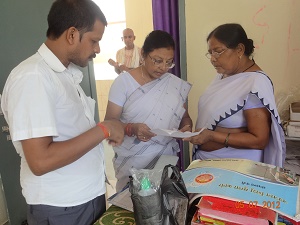HEALTH

55-year-old Geeta Bala is a frontline Auxillary Nurse Midwife (ANM) at Deo Primary Health Centre (PHC) in Aurangabad. Working and training closely with CARE India’s Technical Support Unit (TSU) in Bihar, Geeta now feels as confident as a smart nurse in big hospitals.
“I can also work as a smart nurse” says Geeta who has been working as a frontline ANM worker in Deo since 1983. Deo is a Naxalite affected block and is located nearly 25 kilometres from the Aurangabad district headquarters.
In a family of six, including her son, daughter-in-law and three grandchildren, Geeta is the only source of income for her family. She works at the PHC’s maternity section in the labour room. Geeta never shies away from work, and frequently logs in more hours than the allotted duty, due to insufficient personnel at the centre.
Geeta recounts that earlier, despite putting in hard work, she would often panic while dealing with serious cases, due to poor infrastructure, scarcely available instruments, irregular supply of drugs and her own inadequate skillset. The clinical practices she knew, were not as per the standard protocols which led to regular problems at the clinic.
After CARE India established the Bihar TSU, the team started proving technical and managerial support at district and block levels to strengthen services related to labour rooms, new-born care corners, nurses’ duty areas, maternity wards, immunization areas as per standard protocols and guidelines of Government of India and Bihar. The Unit supported the government in proper utilization of funds in procuring instruments, equipments, drugs and consumables as per delivery load of the health facilities. The TSU also worked in close co-ordination with the government in structural designing/redesigning of the health facilities and continuous capacity-building and mentoring of the labour room posted ANMs through AMANAT (Apatkalin Matritatwa ewam Nawjat Tatparta Karyakram) mentoring programme.
Geeta first got involved with CARE India in March 2014. With proper training and guidance, Geeta started feeling more confident in dealing with her patients.
“Initially I was just doing my job, as a means to make money, since there were limited facilities for quality delivery of services. Hence, my interest in work also never matured. But CARE India’s continuous support, I have a better understanding of my work. I feel motivated to give my 100% towards saving lives of mothers and their new-borns. It’s no longer just a job for me,” Geeta says.
“I would look at fancy hospitals on TV and feel, our PHC would never even manage a fraction of such high-end facilities. But CARE India’s intervention has made it possible for all the staff to be proud of the centre. It feels like a great place to work at, and I feel more efficient post my skill-building trainings. I feel I am also no less than a “Smart nurse”. I take more ownership at work as I am more aware and confident. I am able to deal better with patients, convince and counsel on best healthcare practices, importance of family planning, among other issues,” she adds.
Geeta is now also trying to convince and mentor other ANMs who are yet to receive mentoring support, in order to maintain standard clinical practices inside the labour room.
“I try to teach my granddaughters Rajyalakshmi and Urvashi, not only work and be independent, but also to develop skills in their profession. Because these skills make all the difference in shaping our confidence and in turn, professional success and satisfaction,” Geeta adds.
About Bihar Technical Support Unit (TSU) in Bihar
CARE India’s the Bihar Technical Support Unit (TSU) works towards quality improvement in maternal and new born care healthcare, nutrition, immunization and family planning initiatives to support the Government of Bihar. Under the programme, CARE India provides programmatic and technical skill mentoring at block and district levels. It supports, guides and mentors district and block level leaders to take professional ownership of program, leading to improvement in the skills of the front line workers for better delivery of quality of services.




